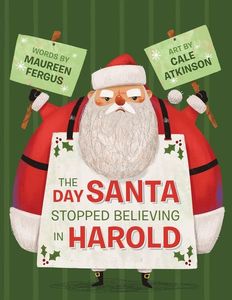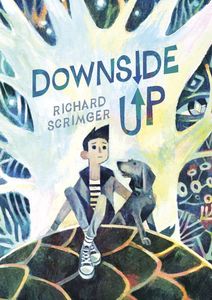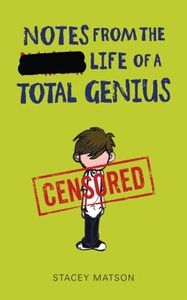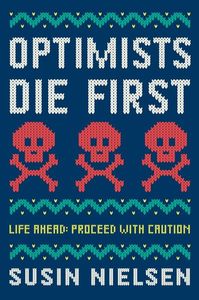Kid Lit Can: What’s So Funny about Kids’ Books? Part 1
By Susan Hughes
A few weeks ago, while thinking about topics for this blog, I came to a startling realization: I’ve never hosted a funny Q and A blog. With funny authors. About funny children’s and YA books. Never.
Why have none of you ever wagged a finger and told me, admonishingly, “Talk to some funny authors! Give us suggestions of funny books for kids!”
But no, I need to take full responsibility for this grave oversight. And I need to correct it, pronto. So, here it is. The funny blog, part 1.
Please give a big welcome to four talented and very funny children’s and YA writers who have generously agreed to answer my questions this month and next: Maureen Fergus, Richard Scrimger, Stacey Matson, and Susin Nielsin!
Susan:
Can you tell us something about your newest children’s or YA book please? Feel free to brag!
Maureen:
My latest picture book is The Day Santa Stopped Believing in Harold. Santa WANTS to believe in Harold but he’s just not sure. Some of his friends are telling him they think Harold's not real. And the Harold that sat on his knee last Christmas looked AWFULLY different. Santa comes up with a plan to find out once and for all if Harold really exists... with hilarious consequences.
Richard:
Speaking of bragging, I have 2 books to talk about this season. In Lucky Jonah (a Red Maple nominee), our hero’s life takes a turn for the weird when he’s given a magic camera. This camera transforms Jonah into whomever he takes a picture of, so that in one crazy day he slips into 10 different lives. Think “Freaky Friday” meets “Brokeback Mountain” (oh yeah, that’s happening all right).
In Downside Up (which just got a starred review in Kirkus), Fred is sad because his dog Casey has died. He finds a portal to a parallel world that looks just like ours – except that in this world his dog is alive. Fred learns that nothing truly loved is ever lost, and also that he is grieving more than he knows.
Stacey:
Notes from the ---- Life of a Total Genius is the last book in the Total Genius trilogy. Arthur Bean is in grade nine, and he’s written a play that gets him into some hot water with the school administration. Never one to back down from a fight, Arthur needs to find some new friends and allies at school in his fight to keep their plays on stage. It’s a little about censorship, a little about finding your voice, and a little about learning who your friends are, and all told through class assignments, reading journals, texts, emails and newspaper articles.
Your CanLit News
Subscribe to Open Book’s newsletter to get local book events, literary content, writing tips, and more in your inbox
Susin:
My newest book is Optimists Die First, out in Feb. 2017. Billed a love story for cynics, it’s about 16-year-old Petula; ever since tragedy struck her family, she’s seen danger in everything from airplanes to ground beef. She’s determined not to let her guard down, even if that means being governed by fear. Then 17-year-old Jacob walks into her art therapy group. He’s the optimist to her pessimist, and he slowly drags Petula out of her rut. But he has secrets of his own.
Susan:
How does it happen? Where does the humour come from?
Maureen:
Sometimes I deliberately set out to be funny but usually it just happens. I think it’s the way I’m wired — I laugh all the time and at almost anything, and that finds its way into my writing. That being said, it’s definitely ok not to be funny — in fact, there are scenes where humour would detract from what I’m trying to accomplish. But I don’t think I’ve ever written anything that doesn’t have at least some humour threaded through it.
Richard:
When I write, humour comes out. I can’t help it, any more than I can help sweating when I go for a run. I see everything – from loafers to dentists to abstract theology to fingernails – in juxtaposition and from a variety of angles.
Why doesn’t the Bible talk more about Jesus’ teeth? Why haven’t His nail parings been saved like pieces of the True Cross? Not everyone laughs. Sometimes no one laughs. (Like now, right? I mean, how funny are God’s nails? Sounds like an Elizabethan oath – gadzails!) But that’s my dharma, my cosmic order. I like to laugh at things I also genuinely admire. Like dentists.
Stacey:
I think it just happens, more than looking for the humour. A lot of my inspiration comes from things that happened to me or to people that I know, and I like to write the scenes in the book to see how they come out.
It would be okay to not be funny; I struggled for a long time to try and leave humour out of my writing, but it didn’t work. Writing that way is against my nature: I can’t help but see the world through a slightly twisted/ humorous lens.
Susin:
Hmm. This is a tough one to answer. I have to have humour in my books. Maybe it’s because I don’t like relentlessly dark stories, so even when I write about dark subjects, I need humour to help me through it. I’m not trying to be funny; I don’t write with punchlines in mind; but all of my books have a great deal of what I like to think of as organic humour (well, okay – and the odd fart joke!).
Susan:
How do you assess whether or not your own stories are funny (assuming you’re going for funny!)?
Maureen:
I know if my own stories are funny if they make me laugh — although, given that I laugh all the time and at almost anything (see question #2, above), perhaps this isn’t the best way to assess…
Richard:
I assess humour the same way I asses every other aspect of writing. Does it work for me? If I’m not laughing (or cheering or weeping or shivering), no one else will.
Stacey:
If I can make myself laugh while I’m writing scenes, then I think it’s a funny story. I can be a hard nut to crack; I rarely laugh out loud when I’m reading things, so if I can do that for myself, then I figure (well, more like hope) that other people will find it funny too.
Susin:
Well, sometimes I make myself laugh when I write, which isn’t necessarily a good sign, laughing at one’s own writing! I guess I’m just always trying to be true to the character, and because I write in first person, humour emerges … I think I have a fairly good sense at this point of whether or not something is amusing, though honestly, I guess that’s up to the reader to judge.
Susan:
What’s the most serious topic you’ve treated with humour – and how did it go? Would you tackle that topic or theme again?
Maureen:
I just finished writing a YA book in which one character has a serious illness. Although I didn’t treat every scene with humour, I did use humor where I could and it didn’t feel awkward at all.
In real life, even in the most difficult or serious situations, not only is it usually possible to find pockets of humour but it is often beneficial to do so. In my experience, laughter — especially shared laughter — can help brighten even life’s darkest moments.
Richard:
Developmental delay. One of my favorite of my narrators is a kid who is a serious step behind.
And – here’s a set up for you – I find it sooo easy to get into his head. His 3 novels are written in a phonetic slang that looks weerd on the page. (In fact the latest offering is called “Weerdest Day Ever”!) I want to give readers a chance to see inside a mind that doesn’t work like theirs. Yeah, I’m laughing, but I take it all very seriously. I’ll write in Bunny’s voice again. It’s a lot like my own.
Stacey:
A parent’s death; plagiarism, bullying, and censorship. All the hallmarks of hilarity!
So many of us use humour as a defense mechanism in difficult situations, and often in grief or times of stress, there are these moments of sheer absurdity, or a need for a release, and laughing is a way to do that. My family has always been those people who make light of things in awful situations to get through, so I don’t think I would know how to be earnest about difficult topics. Would I do it again? Absolutely; it’s the only way I know how to work through these struggles.
Susin:
School shooting. Seriously. In Reluctant Journal of Henry K. Larsen.
It didn’t feel awkward, not at all. But I absolutely worried about it; I thought people might find it offensive or inappropriate. But it went on to win the GG, and the Red Maple, which made me very happy because I knew it had connected with my young readers, too. And no, I would never tackle that subject again, I can’t imagine ever wanting to write two books on the same subject nor can I imagine anyone wanting to read a second book by me on that subject.
Susan:
Could you each tell me if you’re personally funny, you know, not on the page but in real life? If I met you would you keep me grinning?
Maureen:
I promise you would find me absolutely hilarious. And if you didn’t laugh at the first funny thing I said, I’d try again … and again … and again …
Richard:
Wildebeest. (What, the only answers here are yes and no? What about 17? Pyongyang? The feudal system? All of the above?)
Stacey:
I’m really funny. I make myself chuckle all the time. But it’s a really dry sense of humour; at work I’m often told that “people can’t tell that you’re being funny” (a problem when your job is public speaking!) But 90% of the time, I’m not being serious. It’s definitely not a sense of humour that everyone responds to, but at least I know I always have one fan: myself!
Susin:
Am I funny Hahahaha! Oh god … I wish my husband was here so I could get his input on this one! I think I’m pretty funny on occasion – I’m often the one who cracks wise, I definitely have a tendency toward sarcasm (for better or worse).
I think it would depend on where we met. If I met you at a funeral, I wouldn’t keep you grinning. If you met me at book club after two glasses of wine, I might get you to smile once in a while.
Maureen Fergus is an award-winning author of books for kids of all ages. Her novels include The Gypsy King trilogy and Ortega; her picture books include InvisiBill, The Day My Mom Came to Kindergarten and the Buddy and Earl series. She lives in Winnipeg, Manitoba and www.maureenfergus.com is her awesome website.
Richard Scrimger’s recent novels feature an upside-down world and the back of Laura Secord’s cow. Confusion is his natural state. Just ask his children. He has four - no, wait, they have him. Check out www.scrimger.ca or @richardscrimger for an occasional giggle.
Originally from Calgary, Alberta, Stacey Matson now works as an author and an educator in Vancouver, BC. Learn more about her at www.staceymatson.com.
Susin Nielsen lives in Vancouver with her family and two naughty cats. Her website www.susinnielsen.com.
The views expressed by Open Book columnists are those held by the authors and do not necessarily reflect the views of Open Book.
Susan Hughes is an award-winning author of children's books — both fiction and non-fiction — including The Island Horse, Off to Class, Case Closed?, No Girls Allowed and Earth to Audrey. She is also an editor, journalist and manuscript evaluator. Susan lives in Toronto. Visit her website, www.susanhughes.ca.







